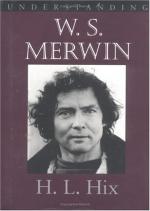|
This section contains 3,151 words (approx. 11 pages at 300 words per page) |

|
SOURCE: Finley, Robert. “The Riddle's Charm.” Dalhousie Review 77, no. 3 (autumn 1997): 313-22.
In the following essay, Finley discusses how Merwin's use of riddles in his poetry contributes to their enigmatic tone.
Habit is evil, all habit, even speech And promises prefigure their own breech.
—John Wheelwright (W. S. Merwin, Epigraph to A Mask for Janus)
Let me begin by posing you a riddle, an old one once posed to Homer by a group of boys, and which, apparently, stumped him. The boys have been hunting, or so they say, and they say to Homer where he sits in the olive shade of the town's central square, “What we have caught and what we have killed we have left behind; what has escaped us we bring with us. What, wise Homer, have we been hunting for?” Here we have a text (what the boys say to Homer), an interpreter (Homer...
|
This section contains 3,151 words (approx. 11 pages at 300 words per page) |

|


